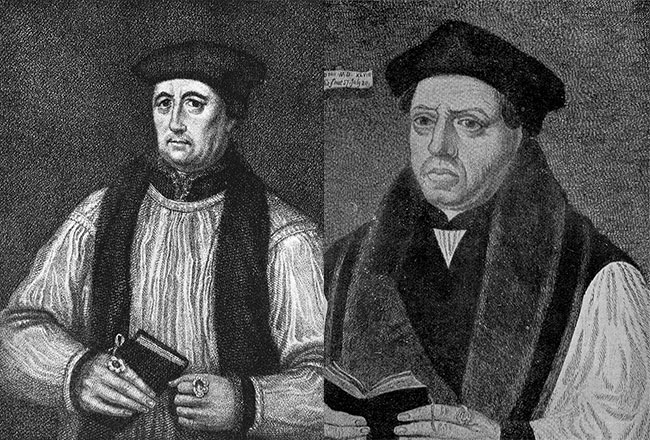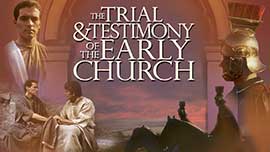MIRACLES, TORMENTS, AND STEADFAST FAITH SHONE IN THE LIFE OF ST. ERASMUS

[Above: Two English bishops who discussed the merits of The Golden Legend. Left: Bishop Stephen Gardiner (from Walter Besant's London in the Time of the Stuarts 1903 public domain) and Right: Thomas Cranmer (from A. E. McKilliam's Chronicle of the Archbishops of Canterbury, 1913 public domain).]
THE REFORMERS of the sixteenth century took a dim view of the veneration of saints that had prevailed in the church for centuries. Thomas Cranmer, Archbishop of Canterbury, objected to the very stories told about them:
[F]oolish, erroneous, and superstitious things be read in the Feasts of St. Blase, St. Valentine, St. Margaret, St. Peter, the Visitation of Our Lady, the Conception, the Transfiguration, Corpus Christi, etc., whereof some be most vain fables, some very superstitious, some directly against God’s Word and the laws of this realm, and altogether be full of error and superstition.
Bishop Stephen Gardiner acknowledged that a key source of such stories, the Golden Legend, might contain “many foolish lying tales.” Even the author of the Golden Legend, Jacobus de Voragine, Archbishop of Genoa, acknowledged that some of his material was apocryphal. However, he presented the story of St. Erasmus (St. Elmo) without any such qualification.
Erasmus appeared in the region of Campania in Italy in the late third and early fourth centuries. Through his preaching, many people converted. When Emperor Diocletian heard of it, he sent soldiers to arrest him. A cruel judge tried to break the saint through torments. Miraculously he survived them all. After suspending him in a position designed to break his veins, the judge had the torturers beat his head, and himself spat in his face. He then ordered him beaten with lead mallets. When Erasmus remained resolute, his persecutors placed him in a pit with venomous snakes. These had no effect on him, so the judge immersed him in fiery brimstone and oil, but the saint lay as if in cold water. So the judge stuffed the saint’s mouth with combustibles and lit them. A storm caused the firepit to burn Erasmus’s persecutors while sparing him. The emperor chained Erasmus’s neck and threw him back into the snake pit but an angel killed the snakes. Erasmus escaped unharmed to preach again.
Emperor Maximian took over, employing a new round of tortures in the attempt to break Erasmus, including a white-hot metal cloak. An angel rescued Erasmus while his persecutors died from the device. Impressed, spectators became Christians. Threatened with another flaming cloak, Erasmus replied,
My Lord and my God hath for me so much done and suffered more than I have deserved. Wherefore I will suffer all that I may suffer for him. . . .”
Erasmus continued to overcome ingenious torments. More angels appeared, idols disintegrated, he preached Christ.
Arrested while preaching in Formia, Erasmus endured another round of torments. (Anyone who cares to read the entire gruesome catalog can find it at Medieval Sourcebook.) At their height, he had a vision of glory.
Then was this holy man right glad and joyful, and he cast his eyes upward to heaven, with lifting up his hands, and there he saw, a clear shining crown come from heaven upon his blessed head.
Tradition says Erasmus died on this day, 2 June 304. Scholars find in his story kernels of fact. And whereas Cranmer would have discarded any absurd tale, some Christians value them for their inspirational worth. Hippolyte Delehaye, a twentieth-century student of hagiography (biographies of saints), uttered a dangerous dictum that could justify almost any falsehood: “Legend, like all poetry, can claim a higher degree of truth than history itself.”
—Dan Graves
----- ----- -----
For an understanding of the suffering of the early church, watch The Trial and Testimony of the Early Church at RedeemTV
The Trial and Testimony of the Early Church can be purchased at Vision Video.
For more on the persecution of early Christians consult Christian History #27, Persecution in the Early Church








